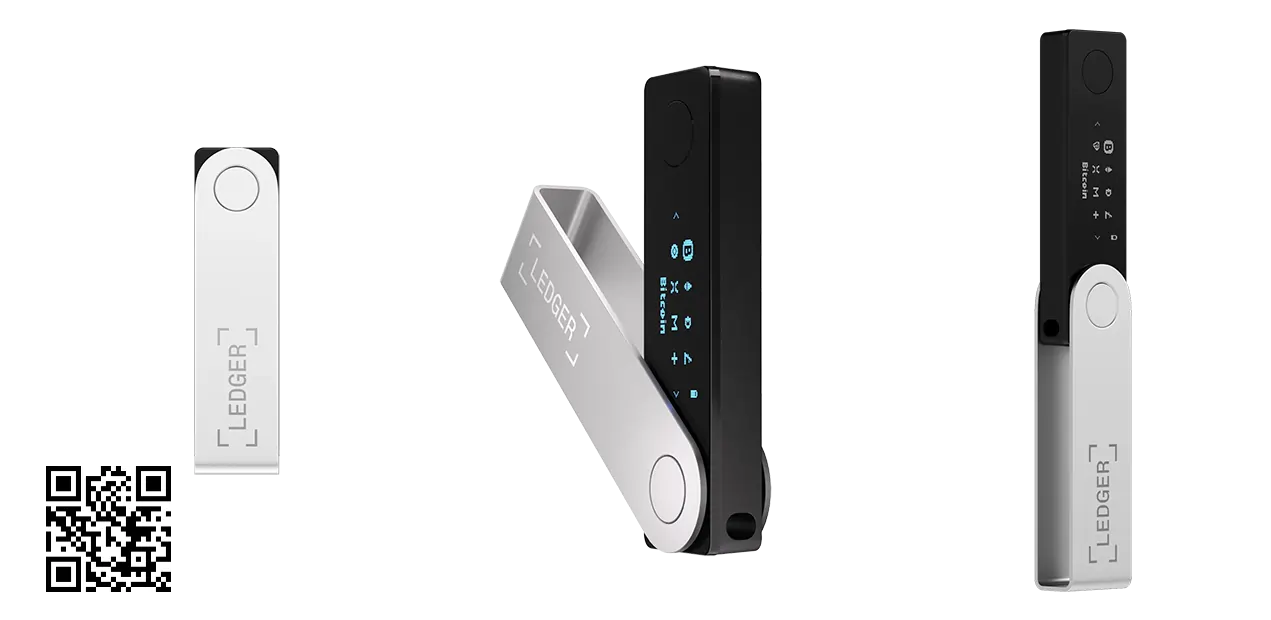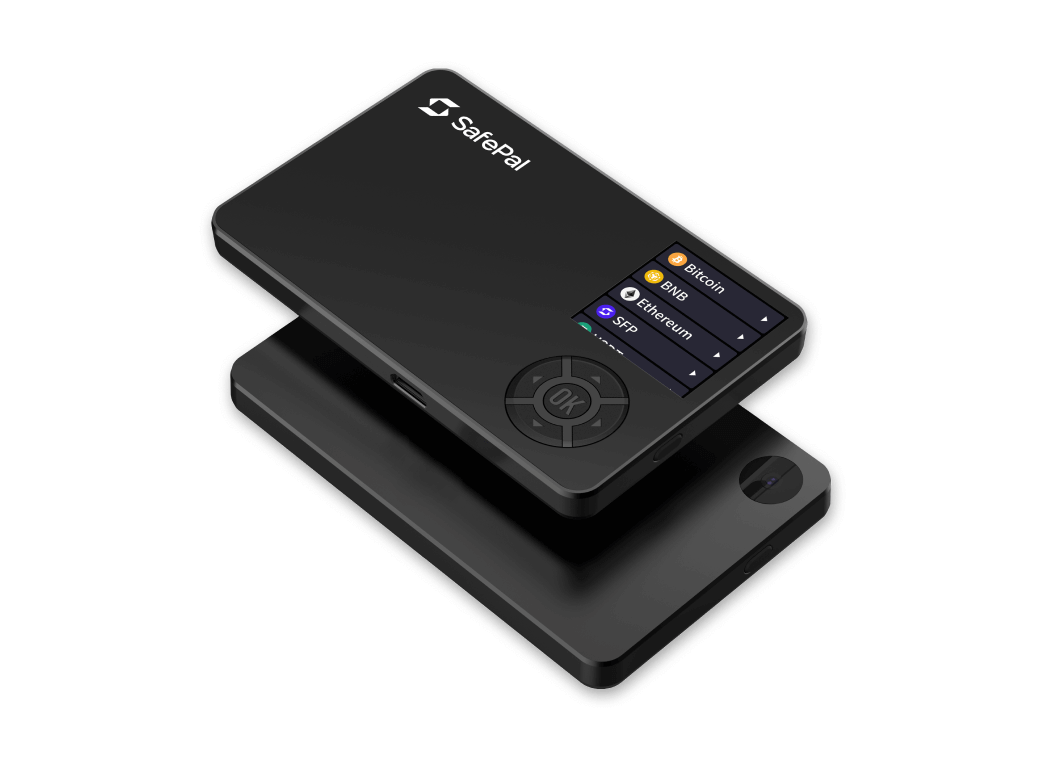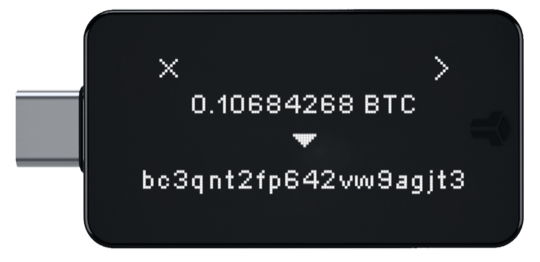



































Top 10 Best Crypto Hardware Wallets
 S
S
 TOP
TOP
 SCR
SCR
 XNO
XNO
 SFP
SFP
Hardware wallets are by far the safest way to store cryptocurrencies. With crypto hardware wallets, you can enjoy peace of mind knowing that your digital assets are safe from the threats posed by online exposure.
As many people shift to long-term holding, the popularity of cryptocurrency hardware wallets has grown, and so has the number of products in the market. With so many options available, choosing the best hardware wallets for crypto can be challenging.
This guide will review the top 8 best hardware crypto wallets, what to consider when choosing a hardware wallet, and walk you through everything you need to know to make a wise decision. Let’s dive in.
1. Ledger Nano X – best overall hardware wallet
The Ledger Nano X is a next-generation hardware wallet developed by Ledger, a trusted name in cryptocurrency security. It’s regarded as one of the best crypto hardware wallets in the market due to its top-notch security and amazing host of features.
The wallet is suitable for both beginners and experienced crypto users. It offers support for over 5,500 cryptocurrencies and seamless integration with dApps and DeFi platforms. Ledger Nano X retails for $160.

» BUY NOW ON LEDGER.COM «
Key features:
- Bluetooth-enabled for mobile compatibility, allowing secure transactions on the go
- Multi-currency support for over 5,500 cryptocurrencies, including Bitcoin, Ethereum, and altcoins
- Large memory capacity to manage up to 100 apps simultaneously
- Secure Element chip (CC EAL5+ certified) which keeps private keys isolated from external threats
- Seamless integration with popular DeFi platforms and NFT marketplaces
- Supports Ethereum-based tokens, including ERC-20 and ERC-721, for NFT storage
2. Ledger Nano S Plus – best budget-friendly hardware wallet
The Ledger Nano S Plus is an upgraded version of the iconic Nano S. Unlike its predecessor, the Nano S Plus offers enhanced features while maintaining affordability at only $85.
Nano S Plus is suitable for crypto enthusiasts who prioritize security and functionality while on a slightly smaller budget. It has a larger screen and increased memory capacity, making it more user-friendly and capable of managing multiple crypto assets seamlessly.

» BUY NOW ON LEDGER.COM «
Key Features:
- Affordable hardware wallet offering advanced security for crypto assets
- Supports over 5,500 cryptocurrencies, including Bitcoin, Ethereum, and altcoins
- Larger screen for improved user experience and transaction verification
- Multi-app support to manage up to 100 crypto apps at once
- Secure Element chip (CC EAL5+ certified) for robust hardware security
- Protection through PIN code and 24-word recovery phrase
- Support for Ethereum-based tokens, including ERC-20 and ERC-721 (NFTs)
3. Ledger Nano Stax – most advanced hardware wallet
The Ledger Nano Stax is a premium hardware wallet featuring a sleek, touchscreen display and cutting-edge security features. It’s suitable for advanced or savvy users seeking a high-end experience. The Nano Stax introduces an innovative touchscreen interface and curved E Ink display.
Since its launch in 2024, the wallet has received positive reviews and recommendations from users around the world. If you’re looking for a high-end wallet and have the budget for it, the Ledger Nano Stax is a great option for you. The wallet is priced at a whopping $425.

» BUY NOW ON LEDGER.COM «
Key features:
- Innovative E Ink curved touchscreen display for an intuitive user experience
- Compact and sleek design with magnetic stacking for easy organization
- Supports over 5,500 cryptocurrencies, including Bitcoin, Ethereum, and NFTs
- Bluetooth-enabled for wireless transactions via the Ledger Live mobile app (iOS and Android)
- Multi-app support with ample storage for managing various crypto assets simultaneously
- Secure Element chip (CC EAL5+ certified) for state-of-the-art hardware protection
- Rechargeable battery with long-lasting performance for on-the-go use
4. Trezor Model T – most secure open-source wallet
The Trezor Model T is a top-tier hardware wallet known for its robust security and open-source firmware. As an open-source device, the wallet’s code is publicly accessible. This means that the community can continuously verify its security.
The wallet features a sleek touchscreen interface and support for a wide range of cryptocurrencies. Trezor Model T retails for $129.
» BUY NOW «
Key features:
- Open-source firmware for full transparency and community verification
- Supports over 1,200 cryptocurrencies, including Bitcoin, Ethereum, and ERC-20 tokens
- Touchscreen display for easy navigation and secure transaction confirmation
- Shamir Backup for enhanced recovery options and
- multi-signature setups
- Seamless integration with DeFi platforms and crypto exchanges
5. KeepKey – best for beginners
The KeepKey hardware wallet is a simple and secure solution for those new to cryptocurrency. With its easy-to-use design and intuitive interface, it’s a great option for beginners.
While it may not have the same extensive range of features as some higher-end models, KeepKey delivers essential security and usability at an affordable price of only $39.

Key features:
- Simple, user-friendly interface perfect for beginners
- Supports a wide range of cryptocurrencies including Bitcoin, Ethereum, Litecoin, ERC-20 tokens, and more
- Large display for easy transaction verification and seed recovery
- USB connection for desktop use via the KeepKey client or third-party wallets like Electrum
- Built-in compatibility with the ShapeShift platform allows for quick and secure trades.
- Offers premium security at a lower price point compared to other hardware wallets.
6. SafePal S1 – most portable hardware wallet
The SafePal S1 stands out with its air-gapped security and compact design. Air-gapped security is a method that ensures your private keys never come into contact with online threats such as malware or hacking attempts.
This is achieved through the use of QR code scanning and offline transaction signing, which allows you to securely authorize transactions without connecting the device to the internet, Bluetooth, or USB ports.
The SafePal S1’s lightweight design and QR code functionality make it an excellent choice for users seeking portability and simplicity while managing their crypto portfolios. The wallet costs $49.99, a reasonable price for you if you are on a budget.

Key features:
- Ultra-portable, lightweight design for secure storage on the go
- Supports over 10,000 cryptocurrencies, including Bitcoin, Ethereum, and ERC-20 tokens
- Secure offline storage with no Bluetooth, Wi-Fi, or USB connection required
- Supports QR code scanning for transaction signing via the SafePal app
- Affordable price point, making it an excellent option for budget-conscious users
- Shock-resistant and waterproof design for added durability
7. Ellipal Titan – most durable hardware wallet
The Ellipal Titan is a tamper-proof hardware wallet with a rugged design, built to withstand the harshest conditions. The wallet is a great choice if you prioritize durability in your crypto storage solution.
It also comes with air-gapped security, making it an awesome blend of safety and durability. With multi-currency support and an intuitive user interface, the Ellipal Titan delivers excellent value. The wallet retails for $169.

Key features:
- Military-grade aluminum alloy body for exceptional durability and protection
- Large, full-color touchscreen display for easy navigation and transaction confirmation
- Completely air-gapped design, with no Bluetooth, Wi-Fi, or USB connection required
- Supports over 10,000 cryptocurrencies, including Bitcoin, Ethereum, and ERC-20 tokens
- QR code scanning for offline signing, keeping your private keys secure from online threats
- IP65-rated water and dust resistance for use in challenging environments
8. BitBox02 – best for privacy
The BitBox02 is a Swiss-engineered hardware wallet built for unmatched privacy and security. It ensures that your private keys remain isolated from online threats while providing an easy-to-use interface.
Built with open-source software and robust hardware protection, the BitBox02 delivers an ideal balance of privacy and security. Its minimalistic design delivers a user-friendly option for all types of investors. Priced at $148, the wallet is suitable for the average crypto investor.

Key features:
- Highly focused on privacy, with no data collection or online tracking
- Secure offline storage with no Bluetooth, Wi-Fi, or USB connection required
- Dual-chip design with a dedicated security chip to protect private keys
- Supports multiple cryptocurrencies, including Bitcoin, Ethereum, and ERC-20 tokens
- Compact, lightweight design for easy portability
- Fingerprint authentication option for added privacy and protection
- OLED display for clear transaction verification
What is a hardware wallet?
A hardware wallet is a physical device designed to securely store your cryptocurrency private keys offline. Unlike software wallets, which are connected to the internet and susceptible to hacking, hardware wallets offer superior security by keeping your keys isolated from online threats.
Hardware wallets are considered one of the safest ways to store cryptocurrency because they provide a secure, physical layer of protection, ensuring that your private keys never leave the device.
Typically, a hardware wallet requires a PIN or passphrase for access and uses encryption to protect your data. They often come with a recovery phrase (also known as a seed phrase) to help you restore your wallet if the device is lost or damaged.
How does a crypto hardware wallet work?
A hardware wallet stores your private key (the secret code that grants access to your funds) offline in a secure, encrypted environment. When you want to make a transaction, you generate the key on your computer or mobile device using a connected software wallet or app.
Instead of sending the private key over the internet to sign the transaction, the wallet sends only the transaction details to the hardware device. The hardware wallet signs the transaction offline using the private key stored inside the device and returns the signed transaction to be broadcast on the blockchain.
To protect your device, you must enter a PIN or passphrase before you can access it. This prevents unauthorized users from accessing your funds even if the device is lost or stolen.
When setting up the hardware wallet, you’re given a recovery seed (usually a 12 or 24-word phrase). This serves as a backup in case the device is lost, damaged, or stolen. Using the seed phrase, you can restore access to your funds on a new device.
Many hardware wallets use USB, Bluetooth, or QR code scanning to communicate with a computer or mobile device. This communication is always encrypted to ensure security.
Choosing the best cryptocurrency hardware wallet
Understanding what to look for in a hardware wallet can help you select one that suits you best. Here are some key factors to consider:
- Security features: Look for PIN protection, secure element chips, passphrase support, and regular firmware updates to safeguard your funds.
- Cryptocurrency support: Ensure compatibility with the cryptocurrencies and tokens you plan to store. For example, if you’re planning to store Ethereum NFTs, choose a wallet that supports the ERC-721 token standard.
- Connectivity options: Choose between USB, Bluetooth, or QR code-based wallets based on your preferred usage and security needs. Many wallets now support two or more connectivity options, so the choice of which one to use depends on you.
- Brand reputation: Stick to trusted brands like Ledger, Trezor, or SafePal, and always buy from official websites to avoid counterfeits.
- Ease of use: Opt for wallets with user-friendly interfaces, touchscreen controls, or mobile app support for straightforward management.
- Durability: Look for tamper-proof designs and robust materials for long-term use.
- Price: Balance cost with features. Higher prices may not always mean better security and functionality, so it’s important to do your research adequately.
FAQs about crypto hardware wallets
What’s the difference between a hardware wallet and a software wallet?
A hardware wallet stores your private keys offline for increased security, while a software wallet stores them on your device, which can be vulnerable to hacks.
Can a hardware wallet be hacked?
While highly secure, a hardware wallet is not entirely immune to hacking. However, the risk is minimal compared to online wallets, as private keys never leave the device.
Are hardware wallets 100% safe?
While hardware wallets are one of the safest options for storing cryptocurrency, they are not 100% risk-free. They provide strong protection against hacking, malware, and online threats by keeping private keys offline.
However, risks still exist. Some risks you should be aware of include loss, theft, or damage to the device, as well as human error (like mishandling or losing the recovery phrase).
How do I keep my hardware wallet safe?
- Keep your hardware wallet in a safe, secure place (like a locked drawer or safe) where it won’t get damaged or lost.
- Never share your recovery seed or PIN with anyone. If someone has access to your seed, they can access your funds.
- Set a strong PIN to protect your device. This adds an extra layer of security if someone gains physical access to your wallet.
- Write down your recovery seed and store it in multiple secure locations (such as a safety deposit box or secure physical storage) to prevent losing access to your funds.
What happens if I lose my hardware wallet?
If you lose your hardware wallet, you can restore your crypto on a new device using your recovery seed. As long as you’ve securely stored the recovery phrase, your funds are safe, even if the wallet is lost or damaged.
Do I need an internet connection to use a hardware wallet?
No, a hardware wallet does not need an internet connection to store your crypto. However, an internet connection is required to send or receive transactions, usually via a connected computer or smartphone.
How do I back up my hardware wallet?
When setting up your hardware wallet, you’ll be given a recovery phrase (usually 12-24 words). Write this down and store it in a safe place. This is your backup in case the device is lost or damaged.
What should I do if I forget my PIN or passphrase?
If you forget your PIN or passphrase, you may need to perform a reset on the hardware wallet, but you’ll still need your recovery seed to restore access to your funds.
Can someone steal my cryptocurrency if they have my hardware wallet?
No, as long as they don’t have access to your PIN or recovery seed. Without the PIN or recovery seed, the wallet’s private keys are still protected.
Are hardware wallets compatible with all cryptocurrencies?
Most hardware wallets support a wide range of cryptocurrencies, including Bitcoin, Ethereum, Litecoin, and ERC-20 tokens. However, it’s important to check compatibility for less common coins or tokens before purchasing a hardware wallet.

